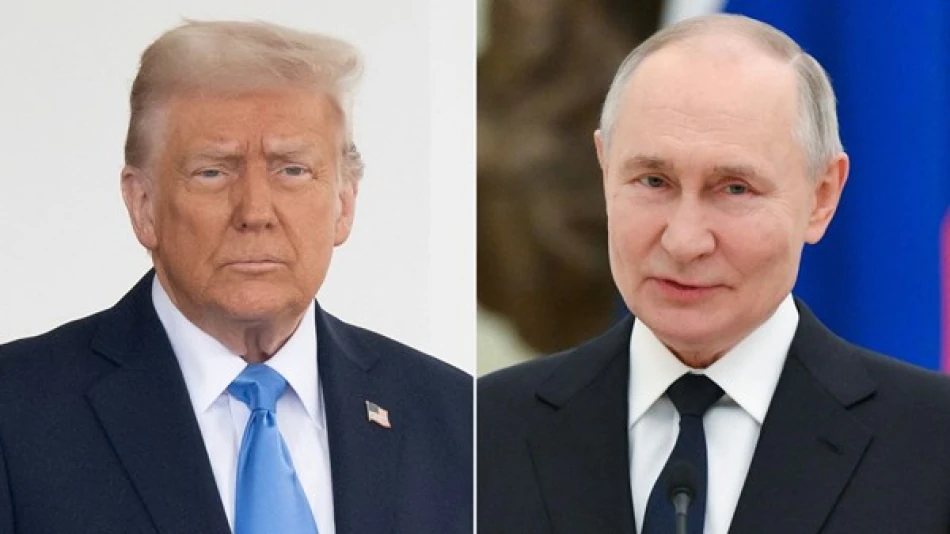
Trump Teases Expectations for Highly Anticipated Putin Summit
Trump's Alaska Summit with Putin: A High-Stakes Gamble to End the Ukraine War
President Donald Trump announced plans for a "constructive" meeting with Russian President Vladimir Putin in Alaska this Friday, aimed at pressuring Russia to end its ongoing war in Ukraine. The summit represents Trump's most direct diplomatic intervention in the conflict since taking office, though his expressed frustration with Ukrainian President Volodymyr Zelensky's refusal to cede territory signals potential friction ahead.
The Alaska Venue: Symbolic Geography
The choice of Alaska as the meeting location carries historical weight, echoing the Cold War-era summits between superpowers on neutral ground. Alaska's proximity to Russia—just 55 miles across the Bering Strait—makes it a pragmatic choice for high-level diplomacy while remaining on American soil. This follows a tradition of US-Russia summits in strategically chosen locations, from Reagan and Gorbachev's meetings in Reykjavik to the Biden-Putin encounter in Geneva in 2021.
Trump's Direct Approach: Pressure and Pragmatism
Trump's stated intention to tell Putin he "must end this war" reflects his characteristic direct negotiating style. However, his concurrent criticism of Zelensky's unwillingness to surrender territory reveals the complex dynamics at play. This approach differs markedly from the Biden administration's strategy, which emphasized unconditional support for Ukrainian territorial integrity.
The Territorial Concession Dilemma
Trump's apparent frustration with Zelensky's position on territorial concessions highlights a fundamental tension in peace negotiations. Ukraine currently controls approximately 80% of its internationally recognized territory, with Russia occupying parts of Donetsk, Luhansk, Zaporizhzhia, and Kherson regions, plus Crimea since 2014. Any peace deal involving territorial concessions would likely face fierce domestic opposition in Ukraine and could set concerning precedents for international law.
Market and Geopolitical Implications
Financial markets have shown cautious optimism about potential peace talks, with European energy stocks and Ukrainian government bonds experiencing volatility based on diplomatic developments. A successful summit could stabilize global commodity markets, particularly grain and energy prices, while failure might signal prolonged conflict and continued economic uncertainty.
Defense contractors and reconstruction companies are closely watching developments, as peace would shift focus from military aid to rebuilding efforts—potentially worth hundreds of billions of dollars over the coming decade.
Historical Precedent and Realistic Expectations
Previous attempts at high-level diplomacy during the Ukraine conflict have yielded limited results. The Istanbul negotiations in March 2022 and various mediation efforts by countries including Turkey and China have stalled over fundamental disagreements about territorial integrity and security guarantees.
Trump's business-oriented negotiating background may offer a different dynamic, but Putin's consistent demands for Ukrainian neutrality and territorial concessions remain unchanged. The Russian leader has shown little willingness to compromise on his stated war aims, even as his military faces ongoing challenges on multiple fronts.
The Zelensky Factor
Trump's suggestion that Zelensky might join future discussions indicates recognition that any sustainable peace requires Ukrainian buy-in. However, his public criticism of the Ukrainian leader's territorial stance could complicate the delicate balance needed for successful negotiations. Zelensky faces his own domestic constraints, with Ukrainian public opinion polls consistently showing strong opposition to territorial concessions.
The Ukrainian president's legitimacy and political survival depend largely on maintaining national unity around territorial integrity—making any compromise extremely difficult without significant security guarantees or alternative arrangements.
Most Viewed News

 Layla Al Mansoori
Layla Al Mansoori






